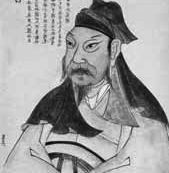The River-Merchant’s Wife: A Letter
translated from the Chinese by Ezra Pound
While my hair was still cut straight across my forehead
I played about the front gate, pulling flowers
You came by on bamboo stilts, playing horse,
You walked about my seat, playing with blue plums.
And we went on living in the village of Chokan:
Two small people, without dislike or suspicion.
At fourteen I married My Lord you.
I never laughed, being bashful.
Lowering my head, I looked at the wall.
Called to, a thousand times, I never looked back.
At fifteen I stopped scowling,
I desired my dust to be mingled with yours
Forever and forever, and forever.
Why should I climb the lookout?
At sixteen you departed,
You went into far Ku-to-Yen, by the river of swirling eddies,
And you have been gone five months.
The monkeys make sorrowful noise overhead.
You dragged your feet when you went out.
By the gate now, the moss is grown, the different mosses,
Too deep to clear them away!
The leaves fall early this autumn, in wind.
The paired butterflies are already yellow with August
Over the grass in the West garden,
They hurt me.
I grow older,
If you are coming down through the narrows of the river Kiang,
Please let me know beforehand,
And I will come out to meet you,
As far as Cho-fu-Sa.
This poem is in the public domain. Published in Poem-a-Day on August 9, 2025, by the Academy of American Poets.
“The River-Merchant’s Wife: A Letter” by Li Bai appears in Cathay, a section of Ezra Pound’s book of poems and translations, Lustra of Ezra Pound (Elkin Mathews, 1916). In this collection, Pound refers to the poet Li Bai as “Rihaku.” In his essay for The Paris Review, “The Poet with Many Names—and Many Deaths,” Chinese American poet and novelist Ha Jin wrote: “In English, in addition to ‘Li Po,’ he once had another pair of names, Li T’ai Po and Rihaku. The first is a phonetic transcription of his original Chinese name, Li Taibai, the name his parents gave him. And Ezra Pound, in his Cathay—his collected translations of classical Chinese poetry—called Li Bai ‘Rihaku’ because Pound had translated those poems from the notes left by the American scholar Ernest Fenollosa, who had originally studied Li Bai’s poetry in Japanese when he was in Japan. Pound’s loose translation of Li Bai’s ‘The River-Merchant’s Wife: A Letter’ has been included in many textbooks and anthologies as a masterpiece of modern poetry. It is also one of Pound’s signature poems—arguably his best known. […] [Li Bai] also has several deaths ascribed to him. For hundreds of years, some people even maintained that he had never died at all, claiming to encounter him now and then. In truth, we are uncertain about the exact date and cause of his death.”

